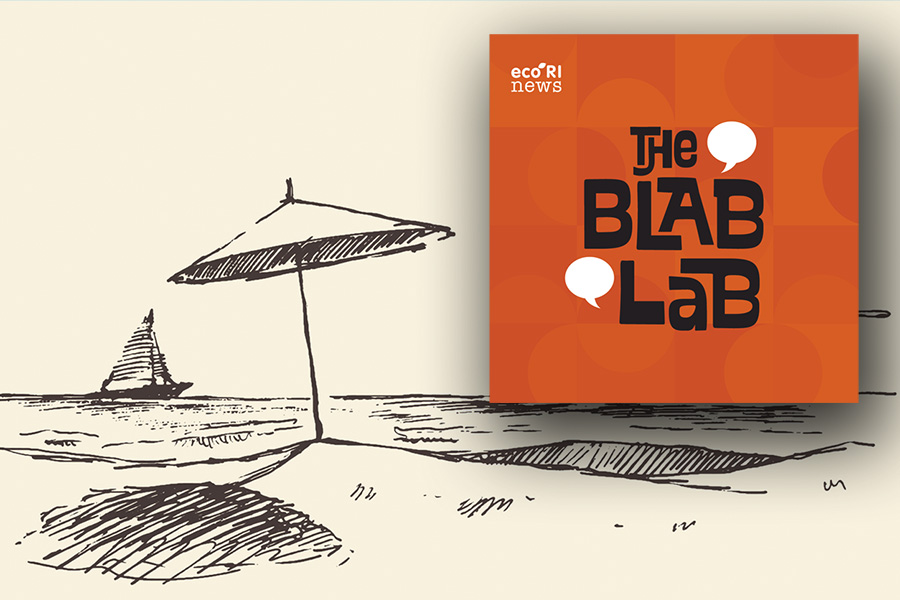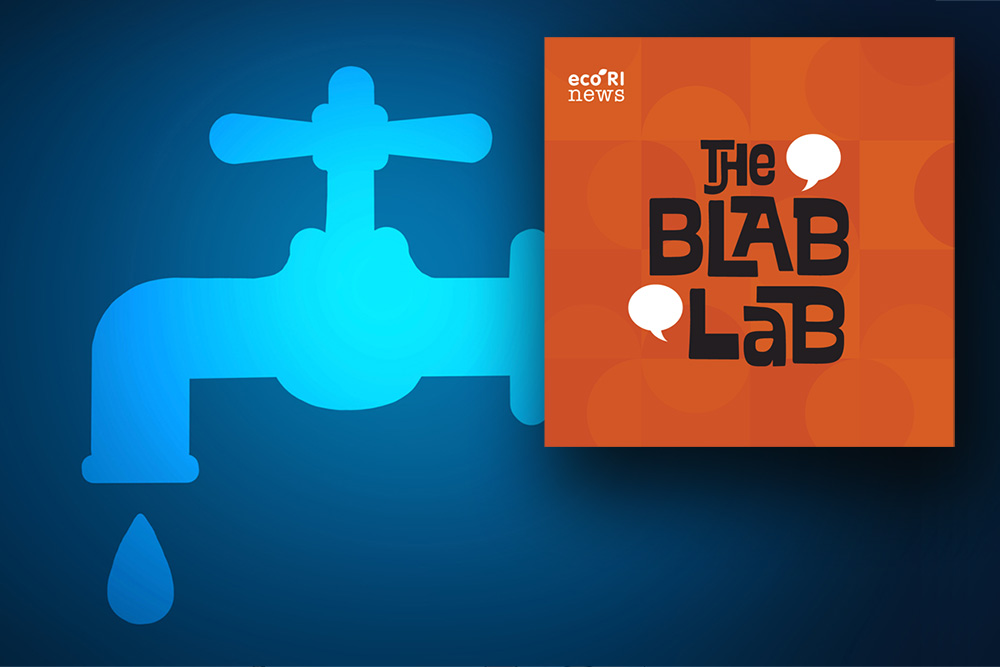Train in Vain: Who’s Protecting Rhode Island from a Toxic Freight Disaster?
May 4, 2023
ecoRI News reporters Colleen Cronin and Frank Carini discuss what is being done to prevent a tragedy like the one that befell East Palestine, Ohio — when a train derailed and fouled the town — from happening here.
Subscribe and listen on iTunes, Spotify, Stitcher, or wherever you get your podcast.
This transcript was edited for clarity and length.
Colleen:
Welcome to the Blab Lab, a twice-monthly podcast from the reporters of ecoRI News, where we unpack the critical environmental issues facing the southern New England.
I’m reporter Colleen Cronin, and today I’m here with newly minted columnist Frank Carini to talk about his latest piece, something that might seem a little bit far away for some listeners and readers, the Ohio train derailment in East Palestine. We’re going to talk about this and whether it can happen here in Rhode Island.
Hi, Frank, thanks for coming on the podcast today.
Frank:
Happy to be here. I think I was required, but happy to be here.
Colleen:
Just to get started. I’m curious, Frank. I mean, I did read your column. But I’m wondering if you could talk to listeners about what sparked the column idea and why you decided to write it.
Frank
Well, when that happened in early February, the first thing I thought of when I saw the reports was something like this could happen in Rhode Island, especially with all the problems you have in Allens Avenue and the Port of Providence — all the problems meaning all the dangerous chemicals and fossil fuels that are stored there delivered there.
So I was thinking about it for writing a story or a column about it, but I just never got around to the local angle. And then a gentleman reached out to us because he had emailed various local and state officials after the Ohio derailment – he was scared, he want to know what kind of prevention measures Rhode Island has in place. But nobody responded to him, so he emailed us. I met with him, and he shared with me kind of the same things I was thinking when I read about these reports: how can it not happen here?
Colleen:
Can you just give us like a two- or three-sentence summary of what happened in Ohio for any readers or listeners who don’t know?
Frank:
Yeah, there was a train derailment. It was a long train. It wasn’t like the smaller commuter rail train. And it derailed and 1.1 million pounds of vinyl chloride spilled — a known human carcinogen linked to liver and brain cancer. It’s also fatal in high doses. And it’s also found in more than a third of the Superfund sites in United States.
So this nasty stuff spilled and was then was burned off, and people are concerned and worried if their pets are going to get sick or die or drinking water supplies are going to be poisoned. We still don’t know yet because it’s going to linger. There’s going to be ramifications from this.
And so … there’s plenty of chemicals and poisons and fossil fuels that travel through Rhode Island, especially the urban corridor, why can’t something like that happen here?
Colleen:
I didn’t realize that trains were getting so big … and force equals mass times acceleration or whatever you learn in physics, that seems a little bit unnerving. So could you talk just a little bit more about that.
Frank:
ProPublica and The Guardian did some investigative reporting. And they found that these kinds of accidents are happening more often because the railroad barons, if you will, are creating these trains that are longer and longer. They’re getting rid of their union — there was somebody in the union that said, hey, there’s problems with the brakes or whatnot, and they ended up … either they terminated the guy or laid them off because they said something.
And they’re making money. It’s always about the money, too. So follow the money. They get these longer trains; they have less employees, less safety checks. There are less people doing the inspections, and they’re lining up two or three miles of cars and then off they go and then things like this happen. If you follow the money, you’ll see that these companies, these railroad barons are making 13% to 15% more and making, you know, a billion dollars more in profit or revenues.
Colleen:
I haven’t heard the word railroad barons since I was in high school. But I did think it’s interesting to know that they still exist today.
Frank:
That’s essentially what they are: corporations, multinational corporations that put profit over people, the environment, public health.
Colleen:
Just to bring it back to Providence. So this person who asked not to be named … he reached out to which organizations trying to get an emergency plan?
Frank:
Well, he wanted a prevention plan. He wants this stuff to happen before there’s an accident. He wants prevention, and that means enforcement and having people that are doing inspections. And we’ve already seen Rhode Island’s not so good with doing enforcement.
So that’s what he was concerned about. He wants prevention plans. So he reached out to the Department of Environmental Management, the AG’s office, the mayor’s office in Providence to see, you know, what’s the plan, how are we preventing this? Do we have enough people inspecting the lines — granted, it could be federal, state, or local officials that oversee this … but nobody responded to him.
Colleen:
Did you reach out?
Frank:
I have not; that’ll probably be a follow-up story and/or column. I just wanted to get that out there that there was somebody that shared the similar thoughts as I did.
Colleen:
He’s worried you’re worried that something like this could happen in Providence or Rhode Island. Has it happened or has something like this happened in the past?
Frank:
I mean, not to the magnitude of what happened in Ohio. But in 2017, there was a train derailment, and 5,500 gallons of ethanol spilled. Ethanol is a dangerous, highly flammable substance. And it’s also a toxin. So that’s a problem.
We’ve also had the rupture of a high pressure on gas line that released like 19 million cubic feet of methane, natural gas. That’s a problem.
We’ve had other fires down there on Allens Avenue with junk piles caught on fire and stuff. So not to the magnitude that the other places have seen — Ohio being the most recent example. But it’s inevitable that something bigger is going to happen.
There’s a lot of stored and delivered chemicals down at the Port of Providence and the urban core already.
Colleen:
Can you talk a little bit too about the context around the neighborhoods around Port of Providence and Allen’s Avenue? Because I think that that’s also important to talk about.
Frank:
Yeah, the 02905 zip code, which was Allen’s Avenue and Port of Providence area, is the most toxic zip code in Rhode Island, certainly the most toxic in Providence County. It’s a lot of lower income families, people of color.
And they’re just getting dumped on. While it has gotten better in the last couple of years … they’re not letting, you know, a dump go in there. It was fought off not just by the community, but local officials and some state officials. They didn’t allow the expansion of a liquefied petroleum gas facility.
There is awareness that these communities are already getting dumped on. We can’t continue to let them get dumped on. But even if nothing else goes in there, there’s still plenty of nasty stuff that could cause a problem and this gentleman that I spoke with — he just wanted to be comforted that, yeah, we have a prevention plan. I’m gonna guess that we don’t do enough or not nearly enough to make sure there’s preventative measures in place.
Colleen:
I’m wondering, just for readers and listeners … Can you just talk about maybe how the reporting process, or the writing processes is different for writing a column versus an article?
Frank:
This is the first time in my career that I will just be focusing on writing columns. This individual column was almost a story. I injected a little bit of my opinion in there. But if I had taken those out, it wouldn’t change the story all that much. And you have to have the facts straight, whether it’s an opinion piece or not. So, you have to have the facts right, but it’s also just a different way of looking at things. You know, I’ve been writing about this stuff for 14 years here in Rhode Island. I’m no expert. But I talked to plenty of experts and plenty of people about what’s going on. And I think, in this day and age, with climate crisis, and the inequality gap, and all this nasty stuff you’re seeing in statehouses across the country, every news organization needs somebody that’s writing opinion, or somebody that can come at it a little more aggressively, if you will, in their writing in reporting …. It’s just in-depth reporting with a little bit of my frustration and anger coming out, I guess.
Colleen:
So, you talked a little bit about where you want to take this, maybe next steps [are] reaching out to the places that this person reached out to, to try and see if they do have a prevention plan. Is there anything else with this that you want to follow?
Frank:
I think we have to look into who’s looking at the railroad. I mean, this gentleman and I were concerned about the railroad, but they’re also transporting things on the roadway with trucks and through the waterways with barges. It’s not just railroads. But yeah, like, what’s the situation of the railroad? How long are these trains coming in? They can’t be two or three miles long. I’ve never seen that. But doesn’t mean it’s not happening. I felt bad for this gentleman; I saw his email to all the departments. It was well crafted. It wasn’t like blaming anybody. He just wanted to be made at ease a little bit. And nobody could even respond to him.
We don’t know how bad Ohio is going to be, what the lasting impacts of that are, or even the radius. And it’s not over and done with, you know; the train companies [are] trying to make it sound that way. But there’s going to be environmental public health implications there for a long time.
And that was his concern. I don’t want that to be here. You know, he’s like, we don’t act … people don’t act until it hits them on their doorstep and tragedy befalls them.
Categories
Join the Discussion
View CommentsYour support keeps our reporters on the environmental beat.
Reader support is at the core of our nonprofit news model. Together, we can keep the environment in the headlines.
We use cookies to improve your experience and deliver personalized content. View Cookie Settings



